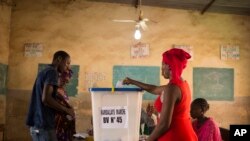The referendum is the first in a series of scheduled polls that are meant to pave the way to presidential elections in February 2024, which Mali's military leaders have committed to hold following pressure from regional powers.
Political parties have been split and the junta has struggled to build momentum for its "Yes" campaign.
Opponents of the amendments are concerned about the new constitution placing more power in the president's hands ahead of the elections amid uncertainty over whether junta leader Assimi Goita will run. They also question the legality of amendments carried out by a non-democratically elected government.
"Too much power in the hands of the future president will squash all the other institutions," said Sidi Toure, a spokesperson for the opposition party PARENA, noting that the new constitution excludes bi-nationals from running for president.
"Mali and Malians are profoundly divided," said Toure, whose party has aligned with a "No" vote.
Ibrahima Sangho, the head of a local election monitoring group, said voter turnout would be a bellwether of public support for the interim authorities and their policies.
"A low participation rate will indicate that they have no legitimacy," he said.
An armed group that signed a major 2015 peace deal, which has been shaky since the junta took power, pulled out of the rewriting process and is boycotting the vote, describing the text as "not sufficiently inclusive."
Religious leaders in the Muslim-majority country have meanwhile spoken out against the decision not to remove secularism as a defining feature of the state, saying it is a legacy of Mali's former colonial ruler France.
But advocates have spoken in favor of aspects of the proposed changes including the creation of a separate court of auditors, the legitimization of traditional leadership - and a clause to include national languages as official alongside French.
The junta delayed the referendum for three months citing logistical problems. Sunday's vote is seen as an indicator of the junta's commitment and capacity to organize voting in a country where jihadist militias have overrun swathes of its arid north and center.
Frustrations over spiraling insecurity spurred two military takeovers in 2020 and 2021, but the junta has been unable to tamp down the insurgency or improve livelihoods in one of the world's poorest countries.

Forum